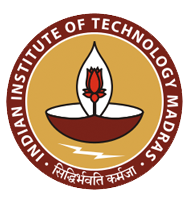16 April - Blog
The 5th Annual Symposium of the Gopalakrishnan-Deshpande Centre for Innovation and Entrepreneurship (GDC) at IIT Madras, held on January 30, 2025, brought together a distinguished group of innovators, policymakers, and thought leaders. The theme, ‘Translating Research into Impact at Scale’, was the cornerstone of a day filled with enlightening sessions and engaging discussions on overcoming the barriers to commercializing research and scaling innovations in India.
Keynote Insights and Visionary Perspectives
The event featured insights from leaders such as Prof. Subra Suresh, Former Director of the National Science Foundation (USA), who highlighted the rapidly evolving landscape of global innovation. He pointed out how technological breakthroughs are happening faster than ever, urging India to focus on building its base of fundamental research, which is crucial to ensuring the country’s global competitiveness. Prof. Suresh’s vision emphasized that research-driven innovation is essential for India to become a leader in the global economy.
Dr. Gururaj Deshpande, Chairman of Sparta Group, expanded on the need to foster a culture of entrepreneurship that embraces innovation as a driving force. He discussed the importance of nurturing talent that can turn societal problems into scalable solutions, reflecting on how the acceleration of change today opens opportunities for bold entrepreneurs to make a meaningful impact.
Panel Discussions – Exploring Pathways for Growth and Collaboration
A major highlight of the Symposium was the series of stimulating panel discussions that provided insights on various aspects of translating research into actionable innovation:
1. Panel Discussion 1: How Can India Become a “Product” Nation?
Moderated by Mr. Kris Gopalakrishnan, Chairman, Axilor Ventures, this discussion featured influential voices like Prof. Ashok Jhunjhunwala, Institute Professor, IIT Madras; Dr. Anand Deshpande, Founder, Chairman & Managing Director, Persistent Systems Limited and Dr. Ashish Lele, Director, NCL, Pune. The panel focused on India’s transition from being a services-driven economy to one that excels in product development and innovation. They discussed the necessity for India to shift its mindset and begin building world-class products that can compete on the global stage. Key recommendations included establishing more industry-academia collaborations, refining IP policies, and creating pathways to scale innovations from the lab to the market.
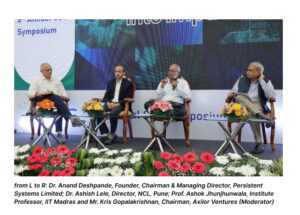
2. Panel Discussion 2: Industry-Academia Collaboration to Create Deep-Tech Startups through Open Innovation
This session, moderated by Mr. Raghuttama Rao, CEO, GDC, underscored the importance of fostering deeper ties between industry and academia to drive commercial outcomes from research. Experts like Dr. Georg Kuegerl, GM – Technology & IP Headquarters, TDK Corporation; Dr. Ajay Mehta, VP, Engineering Technology & Chief Engineer R&D, Shell Projects & Technology, India; Prof. Mohansankar Sivaprakasam, Department of Electrical Engineering, IIT Madras; and Prof. Ravi Bhallamudi Director, NIT Surathkal, Mangalore shared their views on how open innovation models could serve as catalysts for the creation of deep-tech startups. They also explored how innovation hubs and technology transfer offices could be more effective in facilitating these collaborations, thus ensuring that cutting-edge research has a direct route to market application.
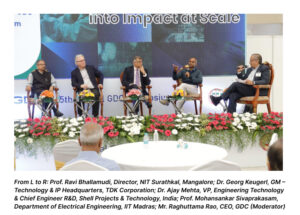
3. Panel Discussion 3: Translating Lab Research to Market through Deep-Tech Startups – The Founder’s View
In this session, moderated by Mr. KV Anand, Chief Innovation Officer, GDC, the spotlight was on the entrepreneurial journey from lab research to market-ready products. Founders of successful startups, Dr. Soumalya Mukherjee, Tan90; Ms. Komal Shah, Periwinkle Labs and Mr. Divanshu Kumar, Solinas, shared their experiences of navigating the challenges of turning deep-tech research into commercially viable solutions. They discussed the importance of an agile mindset, securing early-stage funding, and building strong networks of mentors and collaborators to bridge the gap between research and market application.
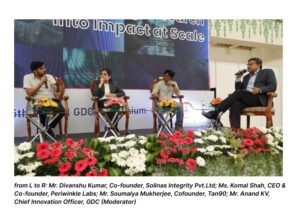
Strategic Shifts and Future Directions for India’s Innovation Ecosystem
The Symposium also introduced a critical shift in perspective, focusing on the commercial potential of deep-tech startups in India and the ecosystem required to support them. While India has a rich reservoir of research talent, the need for a more robust commercialization framework was a key takeaway. Experts emphasized that India’s path to becoming a leader in global innovation hinges on strengthening its policies around intellectual property, scaling funding mechanisms, and ensuring academic research is connected with real-world problems.
The role of philanthropy in driving deep-tech commercialization was explored in a Fireside Chat with Mr. Parth Ahya, Chief of Staff at Renaissance Philanthropy, and Prof. Krishnan Balasubramanian. They discussed how funding and mentorship from philanthropic entities could accelerate the commercialization of breakthrough technologies and scale impactful solutions across the country.
Showcasing India’s Deep-Tech Innovations
On the sidelines of the Symposium, 10 deep-tech startups from across India had the opportunity to showcase their innovations. This exhibition provided them with a unique platform to present their solutions to a distinguished audience, including government officials, industry leaders, and potential investors. The startups displayed cutting-edge technologies in areas such as clean energy, healthcare, and AI, reinforcing the vast potential of India’s emerging startup ecosystem.
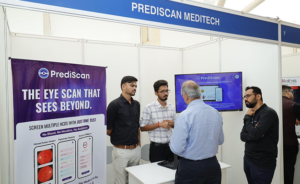
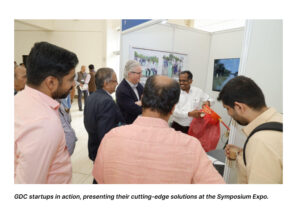
Reflections and Key Takeaways
The 5th Annual GDC Symposium marked a significant step toward defining the future of research commercialization in India. The discussions and panels provided valuable insights on how the nation can evolve its approach to scaling innovations and transitioning from research to real-world applications.
As Prof. Krishnan Balasubramanian, Faculty-in-charge of GDC, emphasized, the role of GDC in fostering the entrepreneurial mindset across academia has been transformative. He reflected on the impact GDC’s programs have had on over 150 startups, helping them go from concept to market, and highlighted the importance of continued collaboration between research institutions, the government, and industry.
The Symposium concluded with a renewed commitment to creating an ecosystem that encourages bold entrepreneurship and embraces innovation as a key driver of India’s future growth.
Looking ahead, GDC remains focused on nurturing the next generation of leaders who will translate groundbreaking research into scalable solutions that address critical global challenges.
Recent Posts
post those are very recent in Dot
Category
browse all your favourite categories
